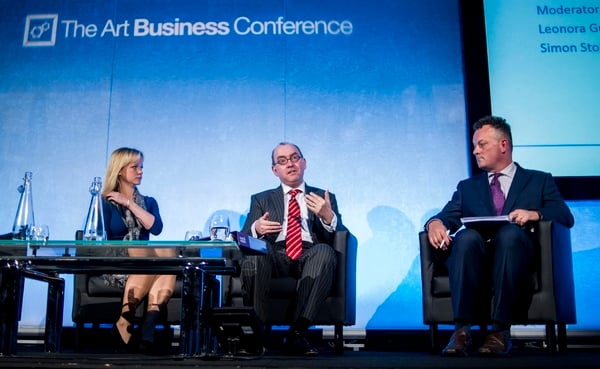Analysis
UK Art Dealers Are Dodging Artist Resale Rights
Can the courts get British artists their due?

Can the courts get British artists their due?

Coline Milliard

The Artist Resale Right (ARR) might have been introduced in 2006, but many UK dealers are still choosing to treat this legal obligation as optional.
“It’s still a big problem,” said Leonora Gummer, a senior manager at the Artist Collecting Society (one of two non-profits in the UK dedicated to collecting ARR). “I still meet dealers, quite often, who say: ‘I’m not going to [pay]’.” Gummer was speaking alongside lawyer Simon Stokes at a panel chaired by Antiques Trade Gazette editor Ivan Macquisten at London’s inaugural Art Business Conference last week.
Since 2006, living artists who are nationals of a country in the European Economic Area (EEA) have been entitled to 4 percent of the resale value of artworks worth €1,000 or more when sold by a professional art trader in the EEA. The ARR applies to transactions above €1,000 and the rate is applied on a regressive rate, which reaches a minimum of 0.25 percent for artworks above €500,000. In 2012, the statute was broadened to the work of artists who died less than 70 years ago.
Macquisten says the Artist Resale Right is “possibly the most contentious issue among the trade, alongside the buyer’s premium.” What emerged from his panelists, however, is that in a global and notoriously opaque art market, legislating, particularly at a local level, remains a tricky business.
While the ARR is seen by many as providing much-needed cash for artists, most of whom struggle to live off of their art, European dealers have long argued that it gives their competitors in regions where the ARR does not apply an unfair advantage.
The British trade, which represents 63 percent of the EU art market (see TEFAF Art Market Report Says 2013 Best Year on Record Since 2007, With Market Outlook Bullish) have been particularly vocal. In 2012, they launched a campaign demanding to raise the threshold from €1,000 to €3,000. It was unsuccessful.

The Art Business Conference 2014 The Queen Elizabeth II Conference Centre
L-R: Leonora Gummer (ACS), Simon Stokes (Blake Morgan), Ivan Macquisten (Antiques Trade Gazette)
As buyers and sellers are jointly responsible for paying the ARR, another major issue of the right is the so-called “cascade effect,” which sees dealers effectively paying twice when they buy and sell the same piece of work in quick succession.
International sales are also a minefield. During the panel discussion, lawyer Stokes—author of the book Artist’s Resale Right: Law and Practice—said there was many uncertainties, and that it was often difficult to give a definite answer on whether or not the ARR applied to a sale taking place abroad. The European Union is well aware of and attempting to address the problems (see Art Industry Representatives Sign European Commission’s New Recommendations on the Controversial Artist Resale Right.)
Meanwhile to avoid headaches—and costs—many dealers continue to ignore ARR regulations, which, as an art market insider put it, “creates a lot of bad blood between galleries.”
Like with most EU directives, enforcement remains a big issue. “The legislation has no provision for anything collecting societies can do to enforce the law,” deplored Gummer, “which is why the honeymoon period has lasted such a long time.”
These days, the successful implementation of the Artist Resale Right rests on the cooperation of sellers. And it will only be fully enforceable in a more transparent market. ACS’s Gummer revealed that of the 700 some galleries the society queries regarding records of sales made every year, only around 170 of them reply.
Stokes estimates the total amount of funds collected due to the ARR in 2013 at £10–10.5 million ($16.2–17 million). Thus, the potential shortfall is staggering, even when taking into account that not all dealers from whom information was requested would have had sales in which the ARR is applicable.
Now, for the first time, ACS is truly flexing its muscle: the society has started legal proceedings against an auctioneer Gummer declined to name. There’s no legal precedent. A representative of DACS, the UK’s other collecting company told artnet News they never had to sue. Gummer hopes the drastic move will encourage others in the trade to clean up their act. If not, more legal action is likely to arise.